One bonus of fleeing the country for warmer climes has been an ability to turn down the volume on the ongoing clusterfuck that is Brexit, back home in Merrie Olde Englande MK 2. That’s not to say I’ve not been keeping up with the news, but I’m able to watch the shambolic lurching of the Tories from calamity to calamity with a tiny bit more detachment, only read the news I feel I need to, and discuss the events with my oh-so echo-y chamber of like-minded friends on Whatsapp, rather than being fog-horned by non-information of nothing happening on a daily basis.
As a semi-tourist here in Mexico, it is hard to get a proper reading on the political situation. My understanding of things like context, history and what the guys in suits on the TV are actually saying is limited, to say the least. However, Mexican politics is, obviously, a fascinating and febrile arena, overshadowed by the ever-present cartels and the War On Drugs, and it would have been inconceivable of me not to have engaged just a bit, even if I was not a political geek.
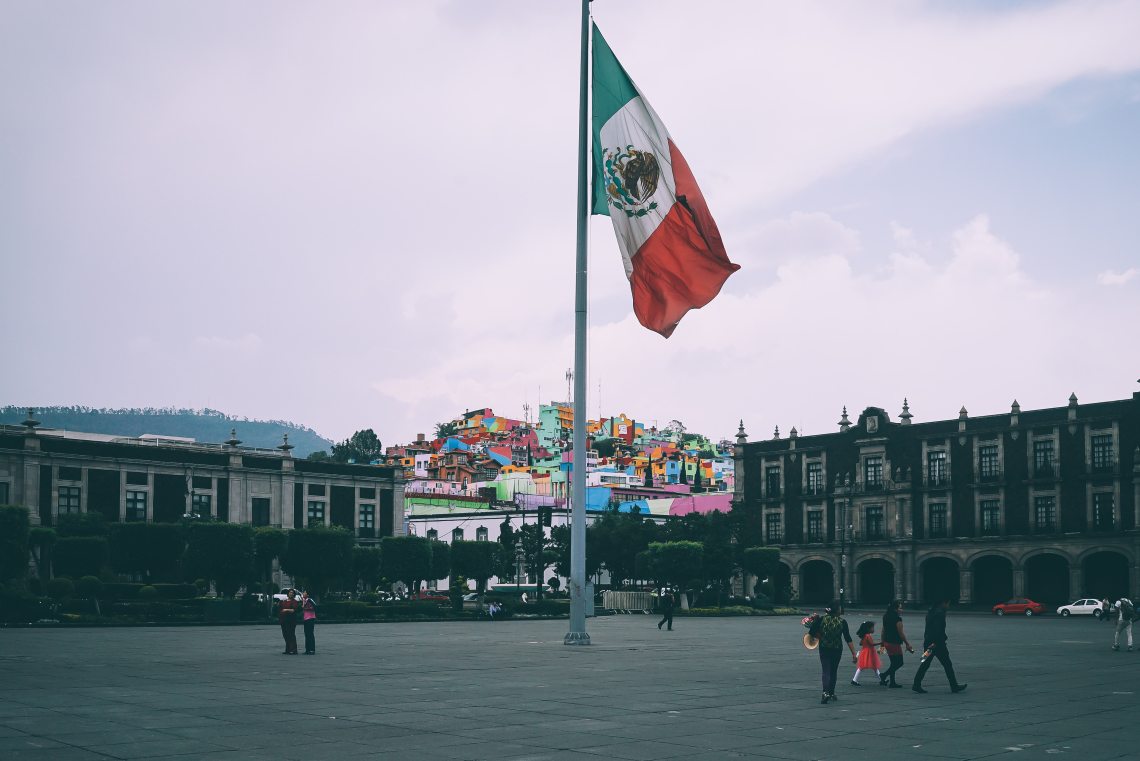
So, in order to educate myself, an idiot, I have decided to have a stab at exploring what is going on here, and providing a bit of a guide for other idiots out there who are interested. There is a very strong chance that this will only be of interest to the five or six friends I talk about politics with regularly, and perhaps my Dad, but I also know that Myriam and her friends will be watching me closely for signs of being at all in favour of the man stepping into the president’s office today, so I will have to tread carefully…
History of Mexico
In order to get a clearer picture of the state of politics (and certainly of the popular view of politics) here today, we have to go back to the Mexican Revolution, in 1910. Coming about as a direct result of the Porfiriato, the dictatorship of Porfirio Diaz, the Revolution left Mexican politics in turmoil throughout the early twentieth century, exacerbated by the Great Depression, until the formation of the National Revolutionary Party in 1929, which brought all the various factions of the Revolution together under one banner. The PRN, later the Party of the Mexican Revolution, and finally the Institutional Revolutionary Party (PRI), ruled Mexico as what essentially was a one-party state, or ‘electoral authoritarianism’, from 1929 to 1988. Following a 6-year term the incumbent president would consult with party leaders to pick the next PRI candidate, who would be guaranteed election as the next president. PRI candidates usually won the presidency with over 70% of the vote, prompting accusations of electoral fraud. Sorry, I forget I’m not writing as an employee of a public body any longer…as a direct result of massive electoral fraud. It wasn’t until the 1940s that opposition parties even made gains in local or municipal elections.

An aside, although PRI are now a pretty solidly centre-right party, their ideology has shifted fairly significantly throughout their history, largely influenced by the policies of the incumbent president, and as a party of revolution, are a fully paid-up member of the Socialist International, which given their support for free market capitalism and privatization of the functions of the state is an interesting little contradiction.
In 1987/88 most of the left-leaning members of the PRI split, and formed a new party, which was duly beaten in the ‘88 elections, although gaining 32% of the vote to PRI’s 50%, and only via a really rather obvious ‘failure’ of the vote counting computer, leading Cuauhtemoc Cardenas, the opposition candidate, to claim victory (unsuccessfully). This was, however, the first genuine challenge to PRI’s grip on the presidency, and opposition parties PRD (Party of the Democratic Revolution) and PAN (National Action Party) began to make gains in elections across the country throughout the 90s.
So a country defined by its revolution against a dictator sets up a system which avoids the coups and military dictatorships common in Latin America in the twentieth century, but by essentially enforcing a constitutional dictatorship, simultaneously riven by corruption but popular, and which holds supreme executive power, undefeated if not unchallenged, for 70 years.
Fox, Calderón, Peña Nieto, AMLO
In 2000, Vicente Fox, of the National Action Party, won the presidency. A landmark, as the first non-PRI president of the United Mexican States. His platform, and his policies, seem to me to have differed very little from those of the PRI. Neoliberalism in economic policies, a furthering of the power of the Catholic Church in government, strong relations with Dubya in the US, etc. Since leaving office, Fox supported Enrique Pena Nieto, of the PRI, in 2012, and Jose Antonio Meade, of the PRI, in 2018.
Despite politically not differing tremendously from the previous administration, it is hard to overstate the importance of Fox’s win. Here was a charming, charismatic, non-political outsider who had overturned 70 years of one-party rule, and promised to bring change to a style of government riddled, even defined by corruption. The factors behind his win are surprisingly similar to those which have swept Andres Manuel Lopez Obrador to the presidential palace – fatigue with the old style of politics, distrust of political elites, a new way of speaking about politics and speaking to the people, and the possibility, however remote, of change.

This non-tribal, non-partisan, even non-ideological flexibility seems to inform so much of Mexican politics, as we’ll see later. Although left/right divides obviously exist, the bigger dividing lines seem to be corruption and drug trafficking, and approaches to these. The Mexican voters I’ve spoken to certainly don’t tend to discuss left/right issues in determining their voting choices – several of the more left-leaning people I spoke to were adamant in their vehement opposition to the ‘tropical socialism’ of new president, and you only need to look at the make-up of his ostensibly radical leftist party to see that it has appeal across the traditional political spectrum.
2006 brought more pain for the PRI, with Felipe Calderon of PAN narrowly edging out his centre-left rival Andres Manuel Lopez Obrador of the PRD, leaving PRI in an unprecedented 3rd place, with a miserly 22% of the vote. An extraordinary election in many ways, as Obrador claimed the election was a fix, a sham, and stolen from him and the PRD, and went as far as setting up a rival cabinet and shadow government, being sworn in as legitimate president in an outdoor ceremony in front of 100,000 supporters, and finally occupied the Zocalo and six mile stretch of Reforma with a ‘tent city’, with somewhere between 350,000 and 2 million protesters sleeping in the city along with Obrador until the recounts confirmed the results. The Guardian stated that “while Mr López Obrador’s claims convince many Mexicans suspicious of all things electoral due to the fraudulent tradition that helped keep one party in power from 1929 to 2000, the evidence produced persuades few serious commentators”. So there we go.
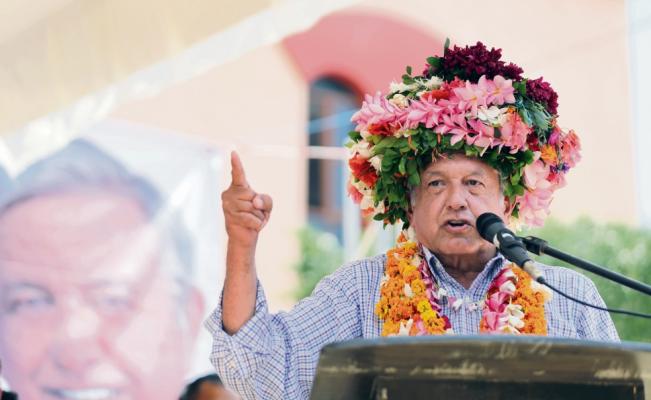
12 years of a PRI-less Mexico did not bring the difference most voters were hoping for. The economy flatlined, and long-awaited change in the approach to the cartels failed to materialise. Calderon’s War on Drugs defined his presidency, and brought a new level of violence to Mexico. Between 2007 and 2016, nearly 200,000 people were murdered as a direct result of the battle against the narcos under Calderon, and a further 28,000 have been reported missing. Obrador’s protests, comic in many ways, certainly highlighted the basic indifference PAN seemed to have towards improving the lot of the people. Felipe Calderon was buffeted by corruption scandals, and in 2012 the election came down to a straight fight between Shadow President Lopez Obrador, and a resurgent PRI under Enrique Pena Nieto.
The vote was highly contested, unsurprisingly, but recounts eventually confirmed Pena Nieto, and a revitalised PRI, as winners with 38%, to Obrador and PRD’s 31%. Both PRD, and PAN, accused PRI of buying the vote, literally giving gift cards to potential voters in return for their support. Obrador’s arguments this time around were somewhat more convincing, but failed to have an effect on the result. The Economist described Pena Nieto as ‘the least bad choice’, when compared to the disappointing 12-year tenure and ‘shambolic campaign’ of PAN, and the ‘disgraceful behaviour’ of Obrador.
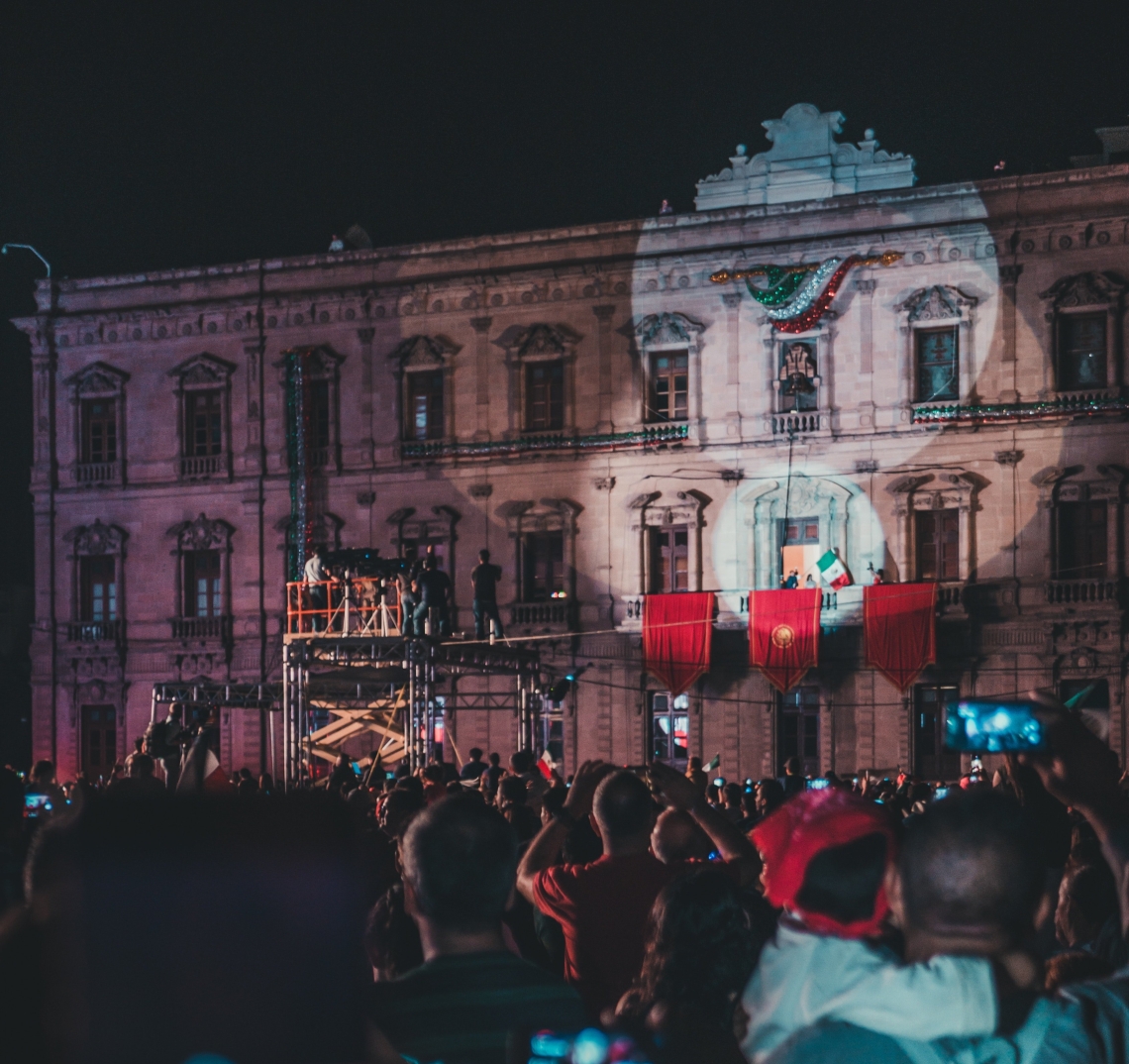
And so, 6 more years of PRI. Opponents feared a return to the tactics of cutting deals with the cartels in return for relative peace, and widespread government corruption, whereas supporters went hard on the failure of the War on Drugs, and how Mexicans were tired of a fight few originally supported, essentially paying the price for the USA’s addictions. Overall, it can’t be said to have been a roaring success. Pena Nieto received the lowest presidential approval ratings since they began collecting them in 1995. Accusations of government scandals, electoral fraud and corruption were rife, and the list of PRI ex-governors from the period now facing criminal charges is too long to list, but includes Javier Duarte from Veracruz, who’s wife is currently enjoying a fairly lavish lifestyle in Belgravia, London, living it up on the proceeds of her husband’s misdeeds.
Election 2018
A fascinating campaign, at least from the outside. In the run-up, PAN and PRD (ostensibly centre-right and centre-left parties) joined forces to present a unified front and a single candidate. PRI picked a former economist, lawyer and diplomat, Jose Antonio Meade, who had previously served as Secretary of Energy and Secretary of Finance under President Calderon of the PAN, as their candidate. The wife of former President Calderon, Margarita Zavala stood as an independent, as did a genuine cowboy named El Bronco, and AMLO, the rebranded Andres Manuel Lopez Obrador, tropical messiah and scourge of the ‘mafia de poder’ returned with a newly-formed party, Morena, promising radical reform, anti-corruption and a completely new approach to the War On Drugs. All this against a backdrop of a newly Trumpified USA to the north.
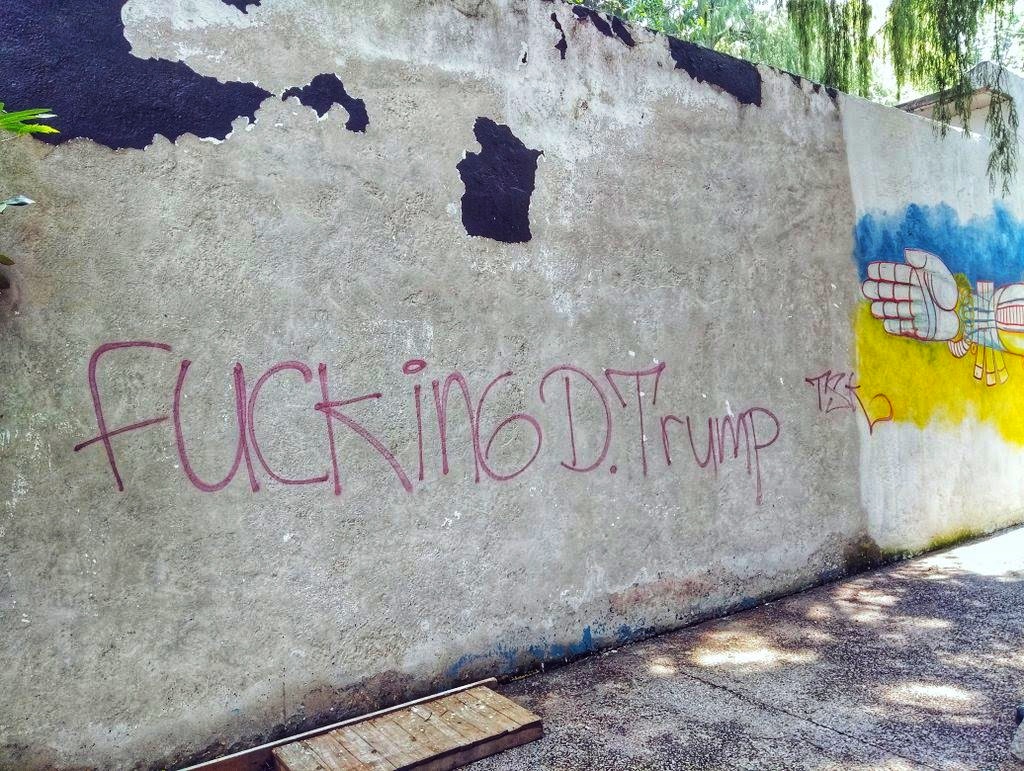
PRI were linked with Cambridge Analytica, and accused of all manner of tactics designed to buy, steal or influence the election. This story from brilliant journalist Andrea Noel is both a rather shocking tale of assault and online abuse, and a fascinating exploration into the dark heart of online electoral fraud. Despite all this, PRI’s rather technocratic, managerial candidate returned 16% of the vote. Por Mexico Al Frente (the PAN/PRD mash-up) did little better, with Ricardo Anaya, and AMLO surfed a wave of popular support all the way to the presidential palace, with a landslide victory of more than 53% of the vote.
AMLO and Morena
It is hard for me to write objectively about AMLO, and harder still to analyse him. Almost every Mexican I have spoken to (not a statistically relevant number) are passionate in their dislike of him. After reading a fascinating, and seemingly balanced article by a couple of writers who seemed to broadly support his aims, I tried to reach out to other AMLovers (via Myriam, who seems to spend a lot of time trolling them on Facebook) for their thoughts to counterbalance what I’d heard from others. I got nothing back from anyone who could be positive about him, although I got a lot more negative comments from critics. My instinct is to support a populist socialist who ran on a platform of anti-corruption, people power and ending the military aspects of the war on drugs. But given the negative feedback, and with a little digging into his background, this instinct gives way to a slight suspicion.
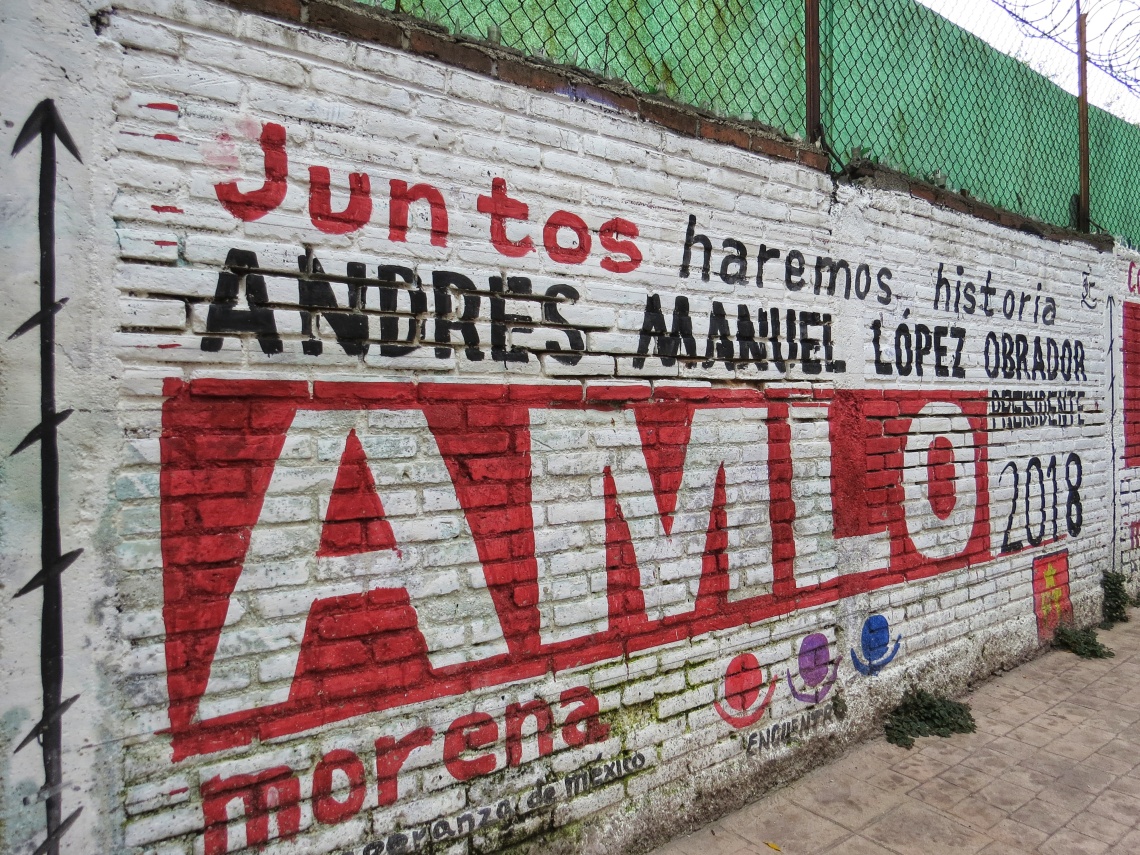
AMLO hails from a small town in the tropical state of Tabasco, and began his political journey in the 70s, as a member of the PRI, part of the senatorial campaign of Carlos Pellicer. He has identified strongly with Lazaro Cardenas, President in the 30s, and Benito Juarez, a Liberal from the 19th century. He worked for the PRI until the 1982 elections, when he fell out with the party. Joining PRD under Cuauhtemoc Cardenas in 1988, he ended up party leader from 1996 to 1999, and finally Mayor of Mexico City in 2000. His recent victory was his third attempt at the presidency, a 12-year campaign that involved visiting every part of the Mexican republic, and two presidential election defeats.
AMLO certainly lives the ‘man of the people’ vibe he presents. As mayor he lived in a small house in a middle class neighbourhood, and drove a Nissan Tsuru. Some of his major election pledges this time around have been to sell the presidential jet, which he is currently doing, to reject bodyguards, arguing that ‘the people will protect him’, and not to reside in the presidential palace (although he is considering living in the Palacio Nacional, currently an administrative building only, and not occupied by a president for 134 years, since the dictator Porfirio Diaz!) . His time as mayor saw him expand local social programs, hand out cash allotments to the elderly, single parents, the unemployed and the disabled, and expand social housing and schools.
However he has constantly been dogged by accusations of hypocrisy and personal patronage – a recent scandal over an aide’s lavish wedding echoed similar scandals involving associates throwing thousands of dollars around in Las Vegas, and receiving bribes. In a somewhat Trumpian manner, AMLO brushes off such criticisms as coming from the ‘mafia de poder’, the vested interests determined to scupper his plans. He was eventually impeached and removed from office as mayor of Mexico City in 2004, over a dodgy land deal.
His party, the newly-formed Morena, is another enigma. On the face of it a radical leftist alternative to the ideologically flexible PRI, the weak PRD and the right-wing PAN, it is actually an incredibly broad and incredibly weird coalition, encompassing minority parties from across the political spectrum, from the Evangelical Christians, through two founding members of the right-wing PAN, to actual full-blown Communists. AMLO has also embraced an extraordinary variety of individuals to fill the positions his landslide victory has allotted him, my personal favourites being ex-Mexican national football captain Cuauhtemoc Blanco, who pioneered the ‘bunny-hop’ move in the 80s, and now opposes same-sex marriage and abortion, Nestora Salgado who led an armed rebellion against drug traffickers in Guerro in 2012, only to be arrested and imprisoned later for kidnapping, and the actor, singer and model Sergio Mayer, famous for his Mexico City strip show, ‘Women Only’. The one constant in the party is AMLO, the sun around whom all these diverse satellites orbit.
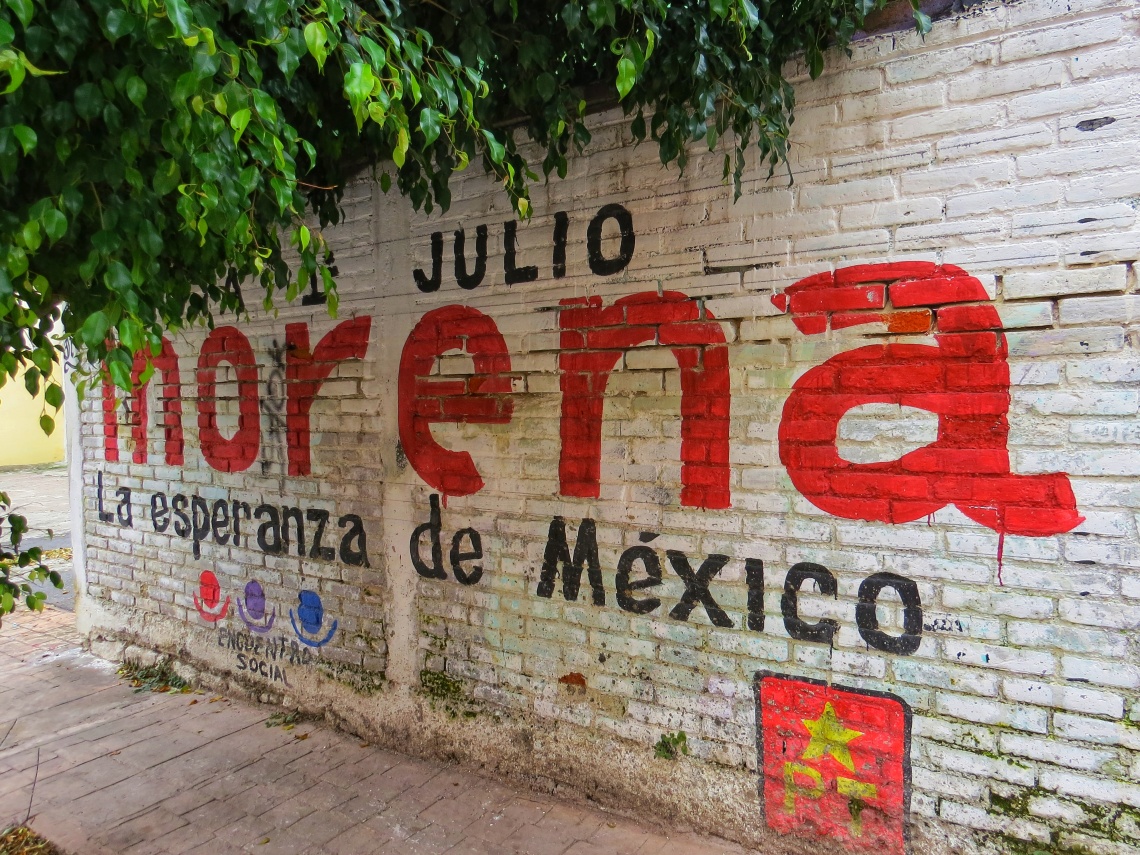
So, I still don’t know what to think. He seems to be a contradictory and confusing figure. One of the most convincing critiques I have heard of him, and one that seems to be being borne out as he takes office, is that over the last 12 years he has become so obsessed with the presidency that he was willing to say whatever people wanted to hear to be elected, with little thought as to how he might make his campaign promises become reality. This is doubly disappointing, not just from another ‘politician breaks campaign promises’ point of view, but as the Mexican people genuinely seem to want change, to want something new from their politicians, and that more broken promises will only entrench the suspicion of democracy and politics already firmly held by many here.
Texcoco airport
The controversy around the new Texcoco airport seems to sum up the messed-up state of Mexican politics in general, and of AMLO in particular. Originally implemented by Vicente Fox, the proposed new airport at Texcoco is designed to lift the strain from the overstretched Benito Juarez airport, and allow Mexico City to continue to serve as an international destination and hub befitting its status as the 12th largest city in the world]. There’s no argument that the airport is not needed, but its construction has been dogged by accusations of corruption, and opposed by environmental groups.
Nevertheless, as AMLO comes to power, the airport is roughly 40% complete. Initially he was heavily against it, flip flopped during the election campaign, eventually concluding that a referendum was needed ‘to give the decision to the people’. This referendum was made available to a grand total of 1.8% of Mexicans, with a whopping 300,000 people voting to end construction of the airport. AMLO has duly announced this as policy, with alternative runways to be built at Santa Lucia in the far south, and Toluca in the far west of the city, to ease the burden on Benito Juarez. This leaves a half-built airport with no purpose, a bleak reminder of the waste of public funds, and a deeply unsatisfactory alternative option, with connecting flights potentially being hours away (crossing Mexico City by any method of transport is not something to be undertaken lightly).Yet the alternative would be environmentally damaging and would continue to shore up the corruption inherent in the Mexican political system. At the middle of this stands a populist president who has changed his mind on the issue a number of times, and has presented his final decision as endorsed by the people following a deeply unrepresentative referendum.

So, having been a one-party state for 70 years following a revolution to overthrow a dictator, the government of change which arrived in 2000 failed to change anything, the return to the norm prompted a populist uprising which united left, right and centre in fruitless opposition, and we end up with a man described as ‘tropical messiah’, ‘radical’, and ‘a Chavez-style authoritarian’. I have no idea what to expect from AMLO. I feel that from my limited experiences, political change is desperately needed here, but I am uncertain if he is the man to enact it. But if not a radical, populist, socialist, then who?

Tonight has turned out difficult because the laptop has been packed. Home Sunday night. Monday 6th UK time? Mxx
LikeLike
I am very insulted that you fail to mention that your Mum is also interested. Mxx
LikeLike
Hi FelixYou are right of course that i am interested in your take on Mexican politics. For once i ama compliant audience as i am starting from a base of almost zero. It is as usual well arguedand articulate. By chance there is a spread in the Guardian today, a large colour picture of theinauguration (with indigenous costumes well to the fore!) and a little piece which describes Amloas “a leftist politician” and emphasises his commitment to “the most impoverished and vulnerable”We shall see. Here things are finally getting interesting and the endgame approaches ( Magnus Carlsenhas just beaten Caruana in the World Chess Championship in London; 12 consecutive draws in the classical gamesbut he won the Rapidplay penalty shootout).So here is my scenario. The current deal has no chance and will not pass through Parliament. The opposition willmove a motion of no confidence which will fail. Then there will be a motion for a second referendum “a public vote”in the words of John Mc Donnell. Not many will be enthusiastic for this but who would vote against? Perhaps just theHard Brexiters and the DUP. I am off to Ladbrokes tomorrow to see what odds i can get.All is well here. I just gave a presentation to the CPS on mental health and no-one threw anything but no more from mei think. Sue is doing one tomorrow on youth which sounds good to me. I am still working but a little less hard; i am due to be kicked out next March but i might get another year which i would take.As to things cultural we just saw a curious film called Disobedience with Rachel Weisz about lesbian affairs in a frum communityin Hendon. Interesting. Good reviews for a film called Roma which apparently is set in Mexico City. Has that hit your radar?I know it’s not your scene but i just saw a terrific gig at the Vortex with a young British drummer called Lorraine Baker.In sport nothing to report; Man U get worse; just watched Saracens beat Wasps easily and England were not too bad with a few interesting newcomers. Any interesting events when we are in Mexico?Keep up the posts they are good to read.Dad xx.
LikeLike